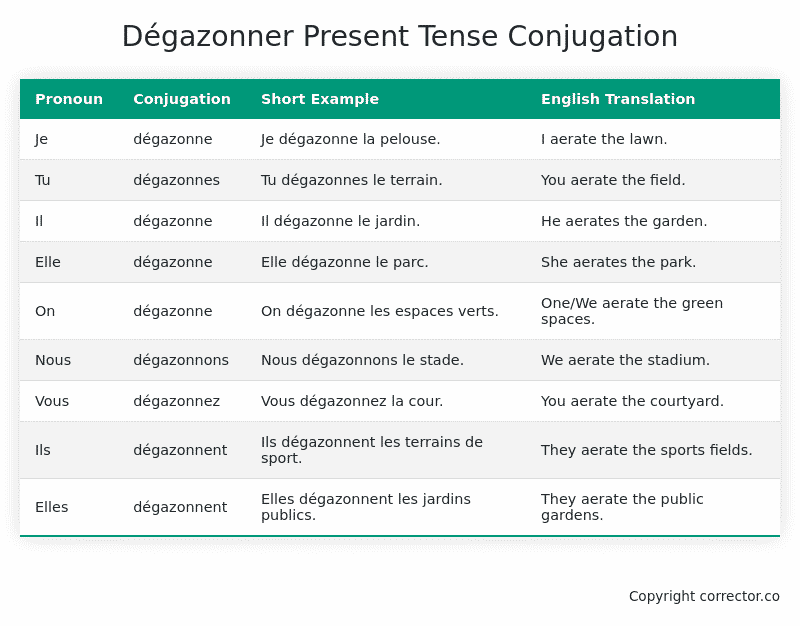Le Present (Present Tense) Conjugation of the French Verb dégazonner
Introduction to the verb dégazonner
The English translation of the French verb dégazonner is “to remove the grass”. The pronunciation of the infinitive form dégazonner is [day-gah-zoh-nay].
The word dégazonner originates from the combination of the prefix dé- (indicating reversal or removal) and the noun gazon (meaning “grass” or “lawn”). It is used in everyday French to refer to the action of removing or eliminating grass from a certain area.
Here are three examples of dégazonner in context:
-
J’ai dégazonné mon jardin pour y installer une terrasse.
(I removed the grass from my garden to install a terrace.) -
L’entreprise a dégazonné le terrain afin de construire un parking.
(The company removed the grass from the land in order to build a parking lot.) -
Nous avons décidé de dégazonner une partie du parc pour y aménager une aire de jeux.
(We decided to remove the grass from a section of the park to create a playground area.)
Dégazonner – About the French Present Tense
To take a deep dive into all the French tenses then see our article on Mastering French Tense Conjugation.
Common Everyday Usage Patterns For Le Present
Interactions with Other Tenses
Table of the Present Tense Conjugation of dégazonner
| Pronoun | Conjugation | Short Example | English Translation |
|---|---|---|---|
| Je | dégazonne | Je dégazonne la pelouse. | I aerate the lawn. |
| Tu | dégazonnes | Tu dégazonnes le terrain. | You aerate the field. |
| Il | dégazonne | Il dégazonne le jardin. | He aerates the garden. |
| Elle | dégazonne | Elle dégazonne le parc. | She aerates the park. |
| On | dégazonne | On dégazonne les espaces verts. | One/We aerate the green spaces. |
| Nous | dégazonnons | Nous dégazonnons le stade. | We aerate the stadium. |
| Vous | dégazonnez | Vous dégazonnez la cour. | You aerate the courtyard. |
| Ils | dégazonnent | Ils dégazonnent les terrains de sport. | They aerate the sports fields. |
| Elles | dégazonnent | Elles dégazonnent les jardins publics. | They aerate the public gardens. |
Other Conjugations for Dégazonner.
Le Present (Present Tense) Conjugation of the French Verb dégazonner (You’re reading it right now!)
Imparfait (Imperfect) Tense Conjugation of the French Verb dégazonner
Passé Simple (Simple Past) Tense Conjugation of the French Verb dégazonner
Passé Composé (Present Perfect) Tense Conjugation of the French Verb dégazonner
Futur Simple (Simple Future) Tense Conjugation of the French Verb dégazonner
Futur Proche (Near Future) Tense Conjugation of the French Verb dégazonner
Plus-que-parfait (Pluperfect) Tense Conjugation of the French Verb dégazonner
Passé Antérieur (Past Anterior) Tense Conjugation of the French Verb dégazonner
Futur Antérieur (Future Anterior) Tense Conjugation of the French Verb dégazonner
Subjonctif Présent (Subjunctive Present) Tense Conjugation of the French Verb dégazonner
Subjonctif Passé (Subjunctive Past) Tense Conjugation of the French Verb dégazonner
Subjonctif Imparfait (Subjunctive Imperfect) Tense Conjugation of the French Verb dégazonner
Subjonctif Plus-que-parfait (Subjunctive Pluperfect) Tense Conjugation of the French Verb dégazonner
Conditionnel Présent (Conditional Present) Tense Conjugation of the French Verb dégazonner
Conditionnel Passé (Conditional Past) Tense Conjugation of the French Verb dégazonner
Conditionnel Passé II (Conditional Past II) Tense Conjugation of the French Verb dégazonner
L’impératif Présent (Imperative Present) Tense Conjugation of the French Verb dégazonner
L’impératif Passé (Imperative Past) Tense Conjugation of the French Verb dégazonner
L’infinitif Présent (Infinitive Present) Tense Conjugation of the French Verb dégazonner
L’infinitif Passé (Infinitive Past) Tense Conjugation of the French Verb dégazonner
Le Participe Présent (Present Participle) Tense Conjugation of the French Verb dégazonner
Le Participe Passé (Past Participle) Tense Conjugation of the French Verb dégazonner
Struggling with French verbs or the language in general? Why not use our free French Grammar Checker – no registration required!
Get a FREE Download Study Sheet of this Conjugation 🔥
Simply right click the image below, click “save image” and get your free reference for the dégazonner present tense conjugation!

I hope you enjoyed this article on the verb dégazonner. Still in a learning mood? Check out another TOTALLY random French verb present conjugation!


